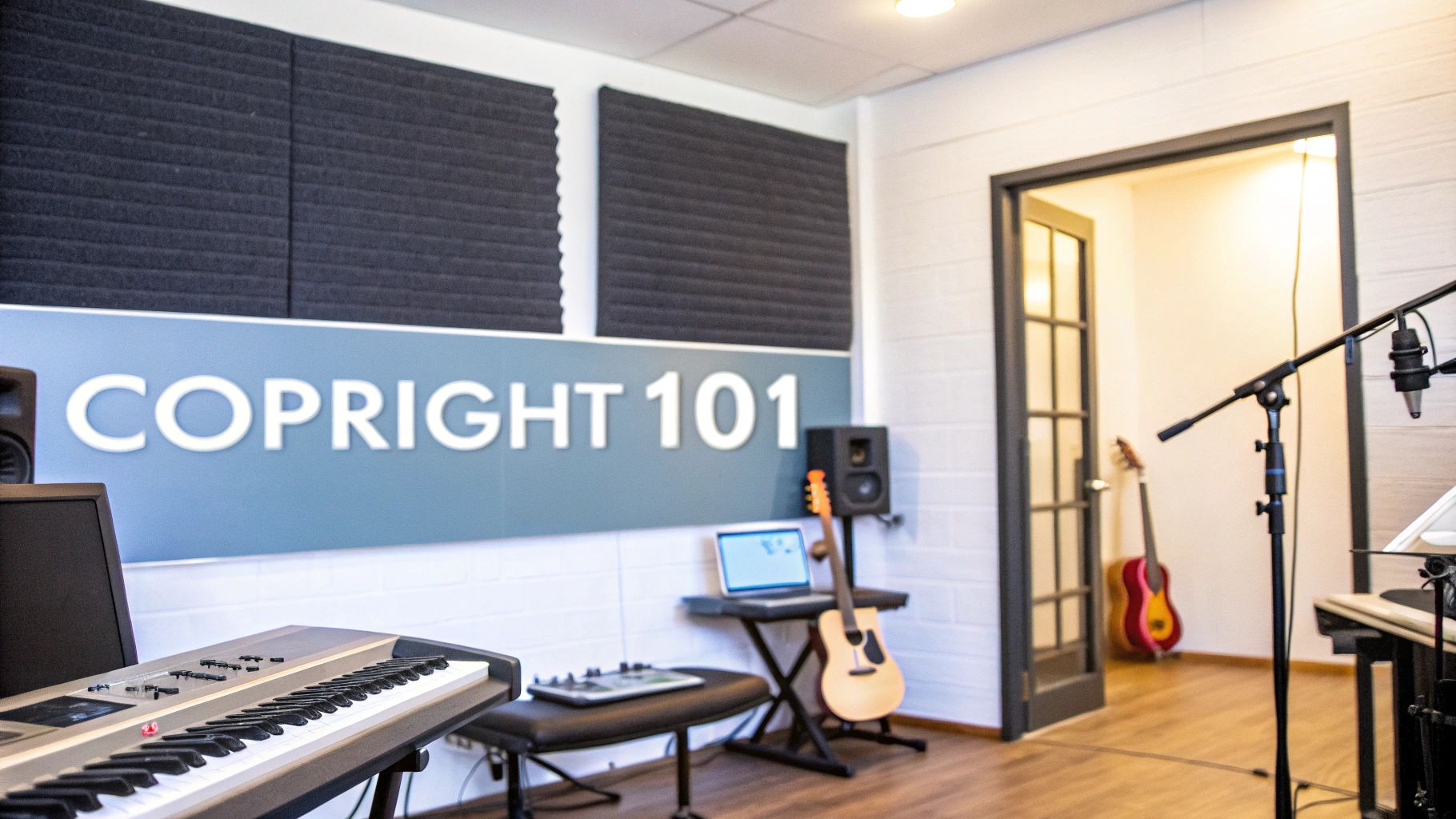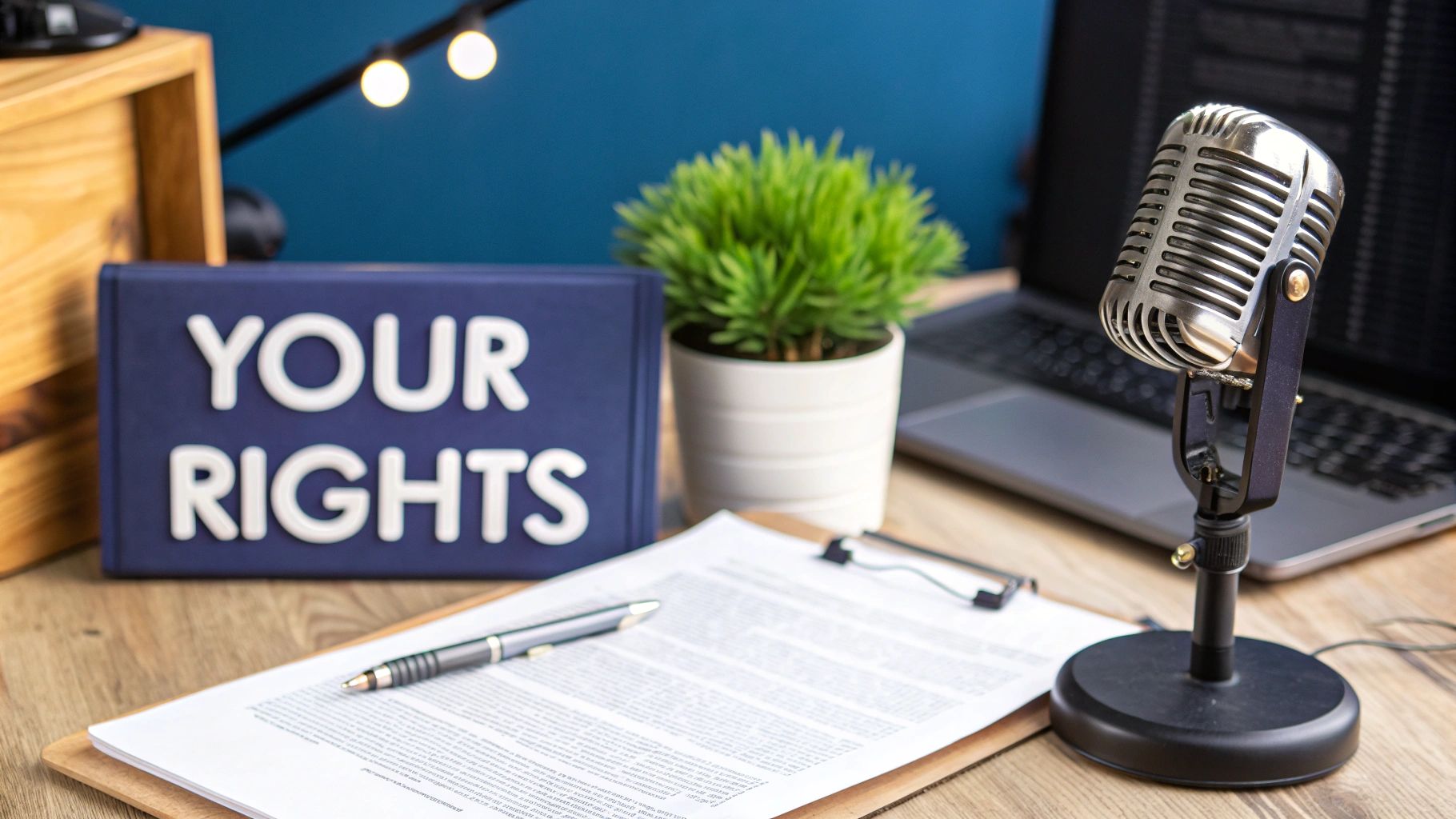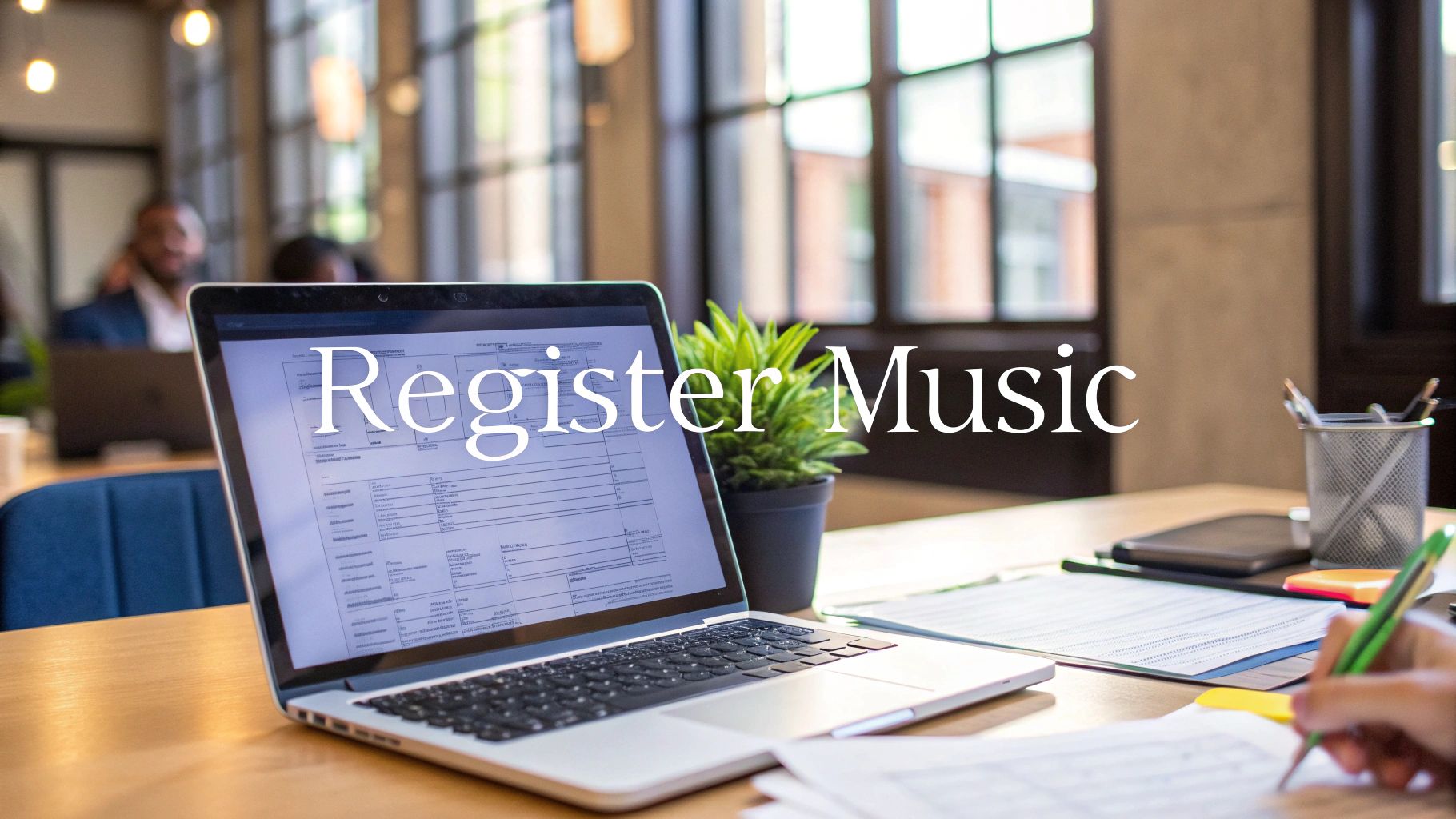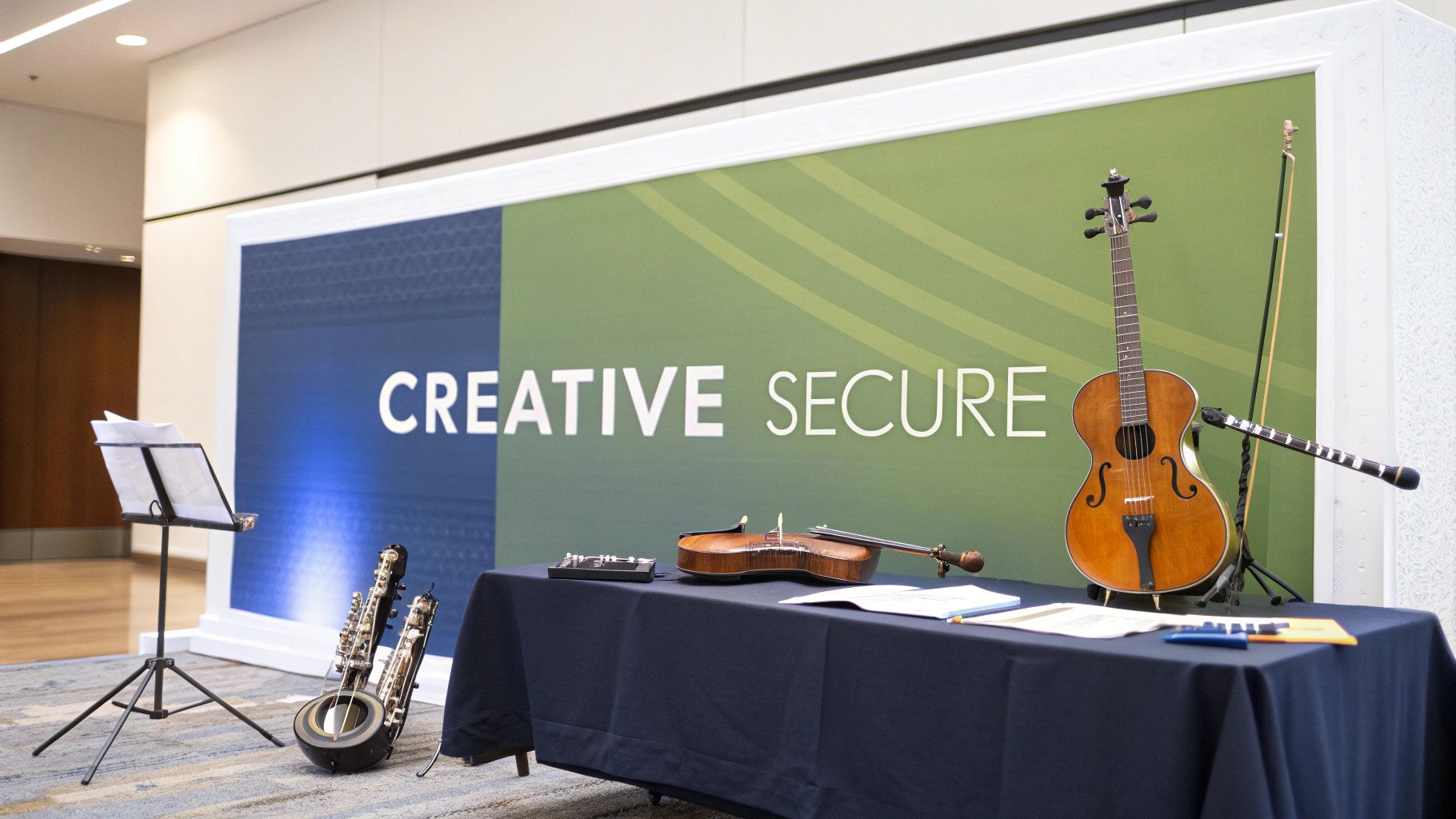The Real Deal on Music Copyright Fundamentals
Let's face it, copyright isn't exactly the most thrilling aspect of making music. It's often seen as dry, technical, and about as enjoyable as a trip to the dentist. But understanding music copyright is crucial if you want to build a sustainable career in music. I've witnessed countless talented artists lose significant amounts of money and opportunities because they didn't grasp the fundamentals. We're talking lost royalties, missed licensing deals, and even careers going off track.
You automatically own the copyright to your music the moment you create it – the melody, lyrics, the arrangement – it's all yours. Technically. That automatic copyright offers some basic protection, but it’s not enough for serious legal situations. What you really need is official registration.
What's Actually Protected?
Your original musical work, known as the composition, is protected. The specific sound recording of that work is also protected. Even a unique arrangement has some protection. However, standard chord progressions are not protected, and neither is the general “vibe” of your music. You can't copyright "melancholic lo-fi beats," unfortunately.
The Copyright vs. Publishing Rights Confusion
Here's where things get complicated, and where many artists stumble. Owning the copyright doesn't mean you automatically own the publishing rights. It's like owning a car but leasing it to someone else: you own the car, but they control its use and earn income from it. Publishing rights are similar; they allow others to use and profit from your music. You might be interested in: Our list of sitemaps related to music publishing. Many artists misunderstand this, even successful ones. I've worked with platinum-selling artists who were confused about why they weren't getting paid despite “owning” their music. They owned the car, but someone else was collecting the lease payments.
Speaking of money, the music copyright industry is booming. Global music copyrights were valued at a staggering $45.5 billion in 2023, exceeding the entire film industry! This growth is fueled by the increasing value of music across streaming, licensing, and live performances. Discover more insights about music copyright growth here. This makes protecting your music more important than ever.

Why Registering Your Copyright is Essential
As mentioned, that automatic copyright is not robust. Registering your music with the U.S. Copyright Office gives you significant legal protection. It creates a public record of your ownership and enables you to collect statutory damages if someone infringes upon your work. Think of it as legal insurance – you hope you never need it, but you’re glad to have it when someone tries to steal your music. Copyright registration is arguably the most important step you can take to protect your music, and we’ll delve deeper into this in the next section. This is not about lawyers and paperwork, but about safeguarding your art, your career, and your earnings.
Stop Procrastinating: How to Actually Register Your Work

Let's be honest, registering your copyright often feels like a chore. It's right up there with going to the gym or flossing. But trust me, it's much simpler than you think, and legally, it's far more crucial than flossing. So, put down your phone and let's get this done.
The Two Paths: eCO and… Paper?
Yes, actual paper. The U.S. Copyright Office offers an online system called eCO. It's the quickest and most affordable option for registering music copyrights. Upload your digital files, and you're practically done. The alternative is physical registration, a slower, more expensive process involving, well, paper. I generally recommend eCO unless you have a specific reason for physical registration, such as pre-1978 works.
Breaking Down eCO: Where People Mess Up
While eCO is relatively straightforward, there are some common pitfalls. Navigating the Copyright Office website can sometimes feel like a trip back to the dial-up era. One frequent mistake is registering individual tracks when you could register an entire album as a collection for the same price. Don't waste your money.
- Choose the Right Application: Seems obvious, but selecting the incorrect application can cause delays. For music, choose "PA" for performing arts.
- Fill Out the Forms Accurately: This is legally binding, so double-check names and dates. Accuracy is paramount.
- Upload Your Work: Ensure your files meet eCO's format guidelines.
- Pay the Fee: The current fee is $45 for a single work or collection, a small price for peace of mind.
Navigating Physical Registration (If You Absolutely Must)
If you absolutely must register physically (pre-1978 works, deposits for the Library of Congress, special collections, etc.), you'll need to print forms, mail physical copies of your work (CDs, scores), and pay a higher fee (currently $125). Consider consulting an attorney for assistance with this process.
Multiple Contributors: The Co-Writer Conundrum
Who owns what? This is a common question with bands, producers, and co-writers. Clear legal agreements, like split sheets, are essential before registration. Clearly defined ownership percentages prevent disputes and potential legal issues when royalties come into play.
Documentation: Saving Your Sanity (and Your Royalties)
Poor documentation is a major headache. Releasing music before registering, misplacing co-writer agreements, or losing early versions can lead to disaster.
- Dated Records: Time-stamp everything. Use email, cloud storage—anything that provides a verifiable record.
- Split Sheets: For collaborations, use split sheets religiously, even with close friends. Business is business.
- Secure Storage: Back up everything, both physically and digitally. Protect your work from data loss.
Registration Options Compared
To help you choose the right registration method, the table below summarizes the key differences between eCO and physical registration:
| Registration Method | Filing Fee | Processing Time | Best For | Protection Level |
|---|---|---|---|---|
| eCO | $45 | 2-10 months | Single works, albums, collections | Strong |
| Physical | $125 | 8-12 months | Pre-1978 works, special collections, etc. | Strong |
As this table illustrates, eCO is generally the faster and more affordable option. However, physical registration remains necessary for specific circumstances.
Registering your copyright isn't glamorous, but it's a fundamental step in protecting your music career. Don't put it off any longer.
Follow the Money: The Economic Value of Your Copyright

Let's be honest. Many artists, even those thriving on Spotify and TikTok, are completely unaware of the potential income they're missing out on by neglecting their music copyright. They're focused on streams and followers, but ignore the crucial backend. It's like throwing a fantastic party but forgetting to charge admission.
It's astonishing. Truly astonishing. I had a client, an indie artist we'll call Anya, who had respectable streaming numbers but struggled to pay rent. She had registered her music (smart move!), but didn't know she was entitled to mechanical royalties. A quick review revealed she was owed over $14,000. Just sitting there unclaimed. I also spoke with a rapper who lost a major sync licensing deal because he couldn't prove he owned the copyright to his beats. He believed the "poor man's copyright" myth (mailing your tracks to yourself) was legitimate. It's not.
Show Me the Money: Where Your Copyright Pays Off
Your copyright isn't just a document; it's the key to accessing various revenue streams. We're talking mechanical royalties each time your song is streamed, downloaded, or reproduced. You also earn performance royalties when your music is played publicly (radio, venues, even some online platforms). Then there's sync licensing, where the real money can be made. Placing your music in movies, TV shows, or advertisements can be financially transformative.
- Mechanical Royalties: Think Spotify, Apple Music, physical sales—every reproduction earns you money.
- Performance Royalties: Live performances, radio airplay, even background music in elevators generate income.
- Sync Licensing: This is the goldmine. TV, films, commercials, video games offer significant earning potential.
- Print Rights: Sheet music sales and arrangements are another often-overlooked revenue stream.
Here's the exciting part: the global music copyright market is booming. It's projected to grow at a 5.2% annual rate through 2030. This means the value of your copyright will only increase. Learn more here. This is a real opportunity.
Beyond the Obvious: Tapping Into Hidden Revenue
Most articles about music copyright focus on the basics. It's dull, and frankly, doesn't help artists maximize their earnings. Beyond the usual, there's a world of hidden revenue streams, particularly internationally. Foreign royalty collection is a prime example. Many artists miss out on money their music generates overseas because setting up international collection can be complex and requires proper copyright registration.
Micro-licensing and sampling clearances are also increasingly important. Someone wants to use a five-second loop of your beat? That's a licensing opportunity! Registering your work simplifies these negotiations and prevents theft, which, sadly, is common.
Protecting Your Future Earnings
The key takeaway is this: understanding music copyright isn't just about avoiding lawsuits (although that's crucial). It's about securing your financial future as an artist. It's about building a sustainable career where you're compensated fairly.
Not all lawyers are expensive and out of touch. At Cordero Law, we understand the music industry and speak your language. We help artists like you navigate the complexities so you can focus on creating great music and getting paid for it.
Copyright Mistakes That Make Me Lose Sleep

I've witnessed some truly concerning copyright practices in this industry, the kind that genuinely cause me sleepless nights. Cleaning up the resulting messes for clients has been a recurring challenge. Let's just say I've seen it all.
The "Poor Man's Copyright": A Lawyer's Worst Nightmare
Let's debunk a persistent myth: mailing yourself a copy of your work does not provide copyright protection. It offers absolutely no legal defense. This outdated practice is completely ineffective. Please, for your own sake, abandon this misconception. Let's move on to the real issues.
Releasing Before Registering: Shooting Yourself in the Foot
Releasing music before registering it with the U.S. Copyright Office is a critical error. You’re essentially leaving your work vulnerable to infringement. You might also be interested in: our site's sitemaps. The key consequence? You forfeit the potential for statutory damages and attorney's fees if infringement occurs before registration.
Statutory damages are a set amount awarded by the court, regardless of proven financial loss. Attorney's fees, of course, cover your legal expenses. These protections are essential. Without them, pursuing legal action becomes prohibitively expensive. I’ve seen a talented client lose millions in potential earnings due to this oversight.
The Co-Authorship Nightmare: Who Owns What?
Co-writing without proper documentation is a legal minefield. I've seen creative partnerships dissolve over ownership disputes. Imagine your song achieves viral success, generating millions of streams, yet you can't prove your contribution. Without a split sheet detailing ownership percentages, you risk losing a significant portion of your earnings. I witnessed this firsthand: 12 million streams resulted in almost no profit for the artist due to a lack of documentation.
My Documentation System: A Career Saver
Now, for some positive news. I use a straightforward, effective documentation system with all my clients. One producer, falsely accused of stealing a beat, was exonerated thanks to his meticulous records from years prior. This system saved his career. More details on this are coming in the next section.
The Legal Industry: Broken, But Fixable
The legal world can be frustratingly outdated. Applying laws designed for a pre-internet era to the complexities of the modern music industry can feel absurd. However, I find genuine satisfaction in helping musicians navigate this landscape. Protecting your music is not just about paperwork; it's about owning your art, controlling your future, and ensuring fair compensation. Seeing clients thrive after securing their work is my ultimate reward.
Digital Protection Strategies That Actually Work
Copyright, registration…we've covered the fundamentals. Now, let's dive into the chaotic world of digital copyright. The internet has drastically altered how we approach music copyright law. The existing laws are, to put it mildly, outdated. Applying them to modern platforms like TikTok or streaming services feels like using a hammer to repair a spaceship. A significant portion of my legal work now involves issues that simply didn't exist when these laws were written.
Content ID: Friend or Foe?
Content ID systems, like the one YouTube employs, are a mixed bag. On one hand, they are incredibly effective at identifying unauthorized use. YouTube, surprisingly, does a decent job. (Don't tell them I said that.) On the other hand, these systems can be overly sensitive, flagging legitimate uses and creating unnecessary problems for creators. Some platforms—I won't name names—treat copyright more like a suggestion than a law, which is incredibly frustrating.
Proactive Protection: Taking Control
Digital protection isn't solely about relying on platforms to police content. It's about the proactive steps you take. I advise all my clients to envision a multi-layered security system for their music. Here's what truly protects your work:
- Watermarking: Embedding inaudible watermarks in your tracks helps you trace the origin of leaks and unauthorized distribution. It's like a digital fingerprint for your music.
- Metadata Mastery: Accurate tagging of your files with essential information (title, artist, composer, etc.) reinforces your ownership claim and simplifies usage tracking. Surprisingly, this can impact your royalty payments.
- Strategic Documentation: Maintaining detailed records of your creative process, including early versions, collaborations, and correspondence, is crucial. I can't emphasize this enough.
- Register Early, Register Often: Seriously, just do it. It's worth repeating again and again.
Let's take a quick look at some available tools:
To help you better understand the landscape of digital music protection, the following table outlines some commonly used tools and services:
Digital Music Protection Tools: This table outlines various digital tools and services that can help monitor and protect your music online.
| Tool/Service | Protection Type | Cost Range | Best Features | Limitations |
|---|---|---|---|---|
| Watermarking Software | Content Tracking | Varies | Identifies Infringement | Can be circumvented |
| Metadata Management Software | Ownership Verification | Varies | Streamlines Licensing | Requires consistent updates |
| Content ID Systems | Automated Detection | Platform Dependent | Efficient Monitoring | Can be overly sensitive |
As you can see, a range of options exists, each with its own strengths and weaknesses. Choosing the right combination for your needs is crucial for effective protection.
The AI Elephant in the Room
The rise of AI-generated music presents complex and concerning legal questions. Who owns the copyright to music created by an algorithm? The programmer? The AI itself? (Believe it or not, this is a serious debate.) The courts are still grappling with these issues, but here's the current thinking:
- Human Input is Key: Significant involvement in the creative process, guiding the AI, strengthens your copyright claim.
- Originality Matters: Like human-created music, AI-generated work must be original to be protected. This will be a challenging aspect to prove.
- The Law is Catching Up (Slowly): Expect new legislation and case law to address this rapidly evolving area.
The implications for music are substantial. AI has the potential to reshape music creation, ownership, and monetization. It's a development that both lawyers and musicians need to monitor closely.
Going Global: Your Music in International Markets
So, you're crushing it in the U.S. Fantastic! But have you thought about expanding your reach internationally? I'm talking about sharing your music with the world. Global copyright is a whole other ballgame. It's complex, confusing, and honestly, a bit strange. I've encountered it all, from artists believing their U.S. copyright automatically applies everywhere (it doesn't) to significant financial losses due to an obscure royalty collection rule in Brazil.
Navigating the International Copyright Maze
Copyright laws vary significantly from country to country. It's like trying to order a coffee in five different languages – you might get what you want eventually, but it'll be a hassle. While the Berne Convention theoretically establishes a baseline level of protection, the practical implementation is inconsistent. For instance, Japan recognizes "moral rights," which give artists control over how their work is used, even after transferring copyright ownership. These rights don't exist in the U.S.
Then there's the registration process. Some countries still have bizarre, outdated registration requirements. I had a client lose thousands in royalties from Brazil due to improper music registration.
Copyright Term Confusion
How long does copyright protection last? In the U.S., it's the artist's lifetime plus 70 years. But in other countries, the duration varies widely. This is important for long-term financial planning, particularly if you have heirs who might inherit your music catalog.
Collecting Your International Cash
How do you actually receive payment when your music is played overseas? This is where foreign rights organizations (PROs) come in. Each country has its own PRO (like ASCAP, BMI, and SESAC in the U.S.), responsible for collecting and distributing royalties. Dealing with numerous PROs can be a bureaucratic nightmare, involving extensive paperwork, different languages, and a considerable amount of waiting.
My International Release Checklist
Having helped countless artists navigate international releases, I've developed a reliable checklist. It covers the following crucial aspects:
- Registration: Identifying which countries require registration and how to complete the process efficiently.
- PRO Affiliation: Joining the appropriate PROs in your target territories to maximize royalty collection.
- Licensing Agreements: Understanding specific licensing requirements in each country to prevent future legal issues.
- Copyright Term Research: Knowing the duration of copyright protection in each territory assists with long-term financial planning, especially for estate purposes.
Making International Copyright Work For You
International copyright can be challenging. But if you're serious about your music career, it's essential. With proper guidance, you can protect your work, collect your royalties, and truly take your music global.
When Someone Steals Your Music: A Battle Plan
Finding your track used without permission is a gut punch. I've witnessed the raw, palpable rage this evokes in my clients. But here's the reality: your reaction is crucial. It can determine the outcome of your case, your peace of mind, and potentially your career.
Documentation Is Your Weapon: Gather Everything
First, document everything. Screenshots, timestamps, URLs—capture it all before it disappears. Trust me, infringers will try to scrub the evidence quickly. Think of it as a crime scene; you need to preserve the evidence. Thankfully, no one's physically hurt, just your artistic pride.
Strategy Session: Takedown or License?
The big question: is this a potential licensing opportunity or a straight-up takedown? It might seem counterintuitive to license to someone who infringed on your copyright. But sometimes, turning infringers into licensees is the smarter financial move. It's also far less stressful than legal action. I had a client, a talented vocalist, whose song was used in a local advertisement without permission. We turned it into a $7,000 licensing deal—much more than she would have recovered from a lawsuit, and significantly faster.
Cease and Desist: The First Strike
For a takedown, the cease and desist letter is your opening move. It establishes the legal tone and is not merely a formality. I have templates that get results, which we can discuss another time. The key is clarity, conciseness, and legal soundness, which is where having a lawyer helps significantly.
The DMCA Takedown: Your Digital Shield
For online infringement, the DMCA takedown notice is your best friend. It's the legal process for removing content from platforms like YouTube and Spotify. Many artists mishandle this by filing incomplete or incorrect notices, leading to their claims being ignored. I can guide you on filing effective DMCA notices and, importantly, following up effectively. Sometimes these platforms need a little nudge.
Litigation: The Nuclear Option (Rarely Necessary)
As a lawyer, part of my work involves litigation. However, lawsuits are expensive, time-consuming, and stressful. It's the nuclear option and rarely the best choice for copyright infringement. It's a last resort. If you have a strong case, solid evidence (remember the documentation?), and significant damages, it might be necessary. You might also find our internal resource helpful. Understand the realities of litigation: costs can easily reach thousands, sometimes tens of thousands of dollars, even for seemingly straightforward cases.
Practical Protection: Staying Sane (and Getting Paid)
The music industry is tough. Protecting your copyright isn't just about legal battles; it's about protecting your well-being. It's also about understanding the economics of copyright enforcement. Choose your battles wisely. Document meticulously. Know when to fight, negotiate, and when to walk away.
